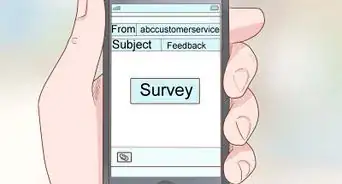This article was co-authored by Trudi Griffin, LPC, MS. Trudi Griffin is a Licensed Professional Counselor in Wisconsin specializing in Addictions and Mental Health. She provides therapy to people who struggle with addictions, mental health, and trauma in community health settings and private practice. She received her MS in Clinical Mental Health Counseling from Marquette University in 2011.
There are 7 references cited in this article, which can be found at the bottom of the page.
This article has been viewed 19,006 times.
Everyone likes praise and to be recognized for their achievements. However, it’s easy to become addicted to praise and positive reinforcement. Determine if you have a praise addiction so you can overcome it and live a healthier, more fulfilling life. Start by evaluating your behaviors and beliefs, then take steps to become more self-aware. Find ways to break the cycle of praise addiction by learning to act with humility and empathy.
Steps
Examining Yourself for a Praise Addiction
-
1Decide whether or not you get jealous of others’ achievements. One way to figure out if you are addicted to praise is to see if other people’s achievements cause you to become jealous. This can be jealousy when other people get recognized for something they did, or when someone gets praised for something similar to things you do.[1]
- Be honest with yourself about your jealousy. Do you get upset, angry, or sad when someone else gets praise?
- For example, you might feel jealous or upset that someone in your company got a promotion, even if you were not in line for the same position, because that person received an elevation in status and you didn’t. You may also feel angry that someone's project at work got an award or special recognition from a superior.
-
2Determine whether or not you compare yourself to others. If you are addicted to praise, you may compare yourself to others. This may happen if someone else gets acknowledged for something. After the person gets acknowledged, you may view anything that person does in light of what you do.[2]
- Do you compare your success to someone else’s? Think about how you feel when someone else is successful for something you also excel at.
- Do you compare the praise someone else gets to the praise you get? Keep note of how often you view the praise you get in relation to that received by others.
- You may focus on the wording, trying to decide if there are real ways to distinguish if your praise is better than the other person's praise. If you run a blog, you might compare statistics of your blog with someone else's. You will feel good if your stats are better, but feel lousy if they are worse.
Advertisement -
3Think about whether or not you only do things to make others happy. People who seek praise may refrain from doing things they want. Instead, they may only do things to please others and get praise.[3]
- This may take the form of dressing how others like, writing songs, music, or stories that others want to see, or ignoring your own ideas in favor of ideas that you know others might like instead.
- If you are doing things only to please others, you may feel upset or disappointed when your “sacrifice” is not acknowledged.
- For example, although you want to make Mexican food, you may make Italian instead because you know you will be praised for the lasagna more than the tacos. At work, despite wanting to do a campaign about sexism, you instead go with a light-hearted campaign to please the people around you.
-
4Figure out whether or not your self-worth comes from others. If you are addicted to praise, you may find yourself unhappy with what you have done until someone tells you it is good. You go seeking others’ approval to feel successful and good about yourself.[4]
- Look at your behavior. When you finish a project, an activity, or even a meal, do you feel accomplished? Are you happy with the results?
- Do you need someone to tell you that you did a good job before you can feel happy about what you have done?
- Does your mood depend on how much attention you are getting from others at any given time, either in person or online?
- For example, you may always ask people what they think of what you have done before you make up your own mind about what you have done. You ask your boss or your coworker what they think about your project before you determine it is good. If they don't like it, you don't like it. If you write a story, you send it to your writing group before you decide if it's good. If they like it, you like it, too.
-
5Determine whether or not you are a competitive person. Sometimes, people who are addicted to praise are extremely competitive. This stems from needing to receive the praise over someone else.[5]
- Do you feel the constant need to be better than someone else? Do you try to be the best so you can get the praise instead of the other person?
- Do you dislike sharing responsibility or achievements with people? Do you hate sharing praise with others?
- For example, you may always need to be the best at something. This means your goal is always to have the best project, make the best meal, or play the best piece of music so you get the most praise.
Assessing Your Behavior
-
1Consider whether or not you ever question praise. Someone who is addicted to praise generally doesn’t notice if they receive too much praise. If you are addicted to praise, you always want praise and can never get enough of it. Everything you do may be so you can get praise.[6]
- It may help to ask yourself questions. Do you ever feel you’ve received too much praise? Or do you always want more?
- Do you start to question the amount of praise you get? Do you feel suspicious that someone is just flattering you and not being honest? If you feel uncomfortable sometimes if you receive too much praise, you may not be as addicted as you believed.
-
2Examine your friends. People who are addicted to praise keep people around them who feed their addiction. These friends might constantly feed a person’s ego, showering them with praise all day every day.[7]
- Do your friends continuously talk about how great you are? Do they refuse to tell you the truth about your life choices in favor or praising you?
- Will your friends tell you the truth if you ask them? Do you ever ask your friends for the truth?
- Do you find yourself going to your friends, seeking praise and reassurance?
- Do you tend to gravitate to friends whom you see as inferior to you in some way?
-
3Think about the rewards given while you were growing up. Many times, people who are addicted to praise were rewarded profusely during their childhood. These people often were given incentives for doing chores, getting good grades, eating their vegetables, behaving correctly, or participating in sports.[8]
- Ask yourself: Did your parents reward you with positive things, like money, treats, gold stars, or presents, if you did well?
- Did you get better rewards the better you performed?
-
4Decide whether or not you dislike criticism. People who are addicted to praise often hate being criticized. This extends to constructive criticism or helpful feedback. Receiving any response that is not praise causes distress.[9]
- Do you get angry, depressed, or upset if someone responds with anything less than praise?
- Do you feel like a failure if you receive constructive criticism?
- Do you get defensive easily when you receive feedback?
-
5Talk to family and friends about your concerns. Ask them if they think you have a praise addiction. Tell them to be honest with you, and listen to them, even if they criticize you.
- If you are uncomfortable asking, pay attention to your interactions with your family and friends. Do they always give you compliments? Do they ever disagree with you? Do they just shower you with empty praise?
- See a therapist if you believe this might be a problem. A therapist might be able to help you fine tune your problem, discover the root, and deal with it.
Breaking a Praise Addiction by Focusing Inward
-
1Face your addiction. The first step to getting over any addiction is admitting that you have one. Admit to yourself that you find validation in praise. Then recognize that this is problematic and that you will not find happiness this way.[10]
- This may not be easy for you. You may not realize you are addicted to praise, or may not be ready to admit it. By facing your addiction, you can start to get over it.
-
2Focus on your progress. Instead of constantly seeking praise for what you’ve done, focus on the progress you make. Ignore whether you did a good or bad job. Instead, find satisfaction from making progress on your projects.[11]
- This means setting goals for yourself. The goal is not to get praise or to do the best. The goal is completion of tasks. What do you want to accomplish?
- For example, if you are trying to learn how to knit, instead of focusing on knitting a sweater everyone will love and praise you for, focus on completing a task. Finish the sweater and find satisfaction in completing it.
-
3Find your intrinsic motivation. One of the problems with being addicted to praise and positive reward systems is that people develop extrinsic motivation, meaning they only do things because they are getting rewarded. For a praise addict, this reward is more praise. Instead of worrying about the rewards, focus on why you doing a task. Find your motivation from within.[12]
- For example, if you are a musician, you may only play to have others tell you how good you are. If you’ve never made it professionally and people don’t recognize your talent or praise you, you may give up. Instead of focusing on the extrinsic motivation, play music because it’s what you love. Remember why you started playing music in the first place.
-
4Trust yourself. One way to help your praise addiction is to trust yourself, your own abilities, and your own opinions. If someone criticizes you or gives you negative feedback, remember that he or she is not necessarily the expert or the person in the right. The criticizer is just one person with an opinion. Evaluate the criticizer's opinion and make your own choice about whether to use it or not.
- Even if you use the criticizer's opinion, use it because you trust yourself to make a reasonable decision about the validity of the other person’s opinion.[13]
-
5Learn humility. Addiction to praise often comes from a place of wanting to feel superior and deny your own flaws and weaknesses. Learning to gracefully accept the parts of yourself that are not perfect is an important step toward breaking your addiction. Humility is not about being weak or hating yourself—it’s about lovingly accepting your own flaws, striving to learn and grow from them, and learning to have more empathy for others. A few ways to practice humility include:[14]
- Listening to other people, even if you don’t like what they have to say.
- Acknowledging and accepting when you are wrong or do not know the answers.
- Taking responsibility for your actions.
- Asking for help when you need it.
Breaking a Praise Addiction through Actions
-
1Surround yourself with people you feel are smarter than you. When you’re addicted to praise, it’s tempting to spend time with people you look down on so that you can feel better about yourself. Instead, focus on being with people whom you see as smarter or wiser than yourself. Make an effort to learn from the people in your life instead of finding ways to feel superior to them.
-
2Ask for honest feedback. Instead of surrounding yourself with people who give you blanket praise, find people who are honest with you. Ask them for honest feedback on your projects, work, or hobbies.[15]
- Honest feedback and constructive criticism help you become better at what you do. You can’t grow if you are surrounded by people who give you empty praise.
-
3Stop seeking praise. One way to help you get over your praise addiction is to stop trying to get people to praise you. Most praise addicts have become adept at receiving praise without asking for it directly. Break yourself of this indirect or direct praise seeking habit.[16]
- Don’t ask people how you did, how they like something you did, or even mention things you have done to others. Stop going to others for validation in your accomplishments.
- You may need to avoid talking to certain people, like your friends who always give you praise.
- You may want to spend a weekend focusing on yourself and staying away from others to eliminate your need for praise.
-
4Praise others. Since praise addicts feel so much envy and jealousy, start trying to break those feelings by praising others when they deserve it. When someone you know succeeds, instead of feeling jealous, celebrate it.[17]
- Celebrating someone else’s accomplishments can help you replace negative thought patterns with positive ones.
-
5Refrain from giving yourself too much praise. Every accomplishment you finish does not need praise. Some things, like going to work or doing the dishes, should be normal behavior. Normal behavior shouldn’t be praised since it’s what you should be doing as part of your everyday life.[18]
- Save praise for things that are above and beyond. Only give yourself praise when you accomplish something extraordinary.
References
- ↑ http://www.inc.com/jt-odonnell/how-a-praise-addiction-can-really-mess-up-your-career.html
- ↑ http://www.inc.com/jt-odonnell/how-a-praise-addiction-can-really-mess-up-your-career.html
- ↑ http://www.fastcompany.com/3049181/know-it-all/how-to-get-over-your-addiction-to-praise
- ↑ https://fortune.com/2013/07/10/how-to-stop-being-a-praise-junkie/
- ↑ http://www.naturalchild.org/robin_grille/rewards_praise.html
- ↑ http://www.cnn.com/2012/03/05/living/overcome-praise-addiction/
- ↑ http://www.cnn.com/2012/03/05/living/overcome-praise-addiction/
- ↑ http://www.naturalchild.org/robin_grille/rewards_praise.html
- ↑ http://www.inc.com/jt-odonnell/how-a-praise-addiction-can-really-mess-up-your-career.html
- ↑ http://www.cnn.com/2012/03/05/living/overcome-praise-addiction/
- ↑ http://www.fastcompany.com/3049181/know-it-all/how-to-get-over-your-addiction-to-praise
- ↑ http://www.inc.com/jt-odonnell/how-a-praise-addiction-can-really-mess-up-your-career.html
- ↑ http://www.fastcompany.com/3049181/know-it-all/how-to-get-over-your-addiction-to-praise
- ↑ https://www.forbes.com/sites/jeffboss/2015/03/01/13-habits-of-humble-people/#7d09e5c449d5
- ↑ http://www.fastcompany.com/3049181/know-it-all/how-to-get-over-your-addiction-to-praise
- ↑ http://www.cnn.com/2012/03/05/living/overcome-praise-addiction/
- ↑ https://fortune.com/2013/07/10/how-to-stop-being-a-praise-junkie/
- ↑ http://www.unk.com/blog/dangers-of-excessive-praise/





































































